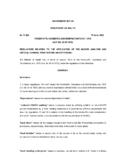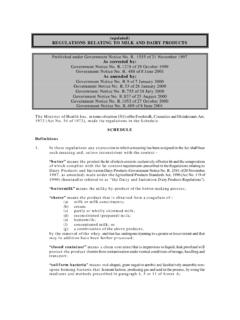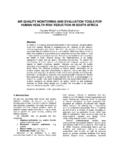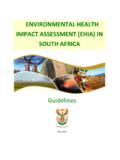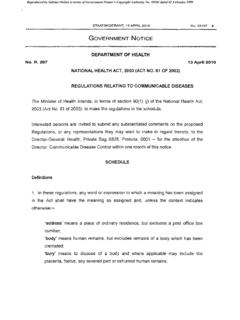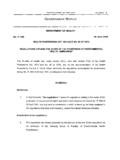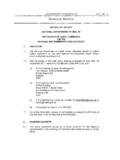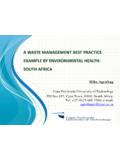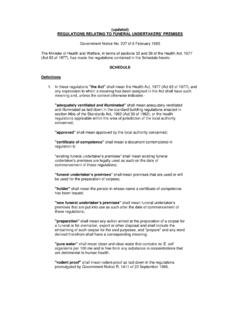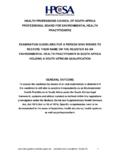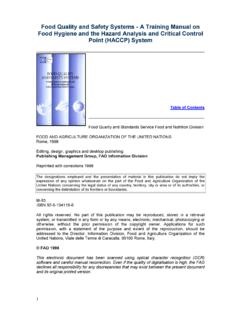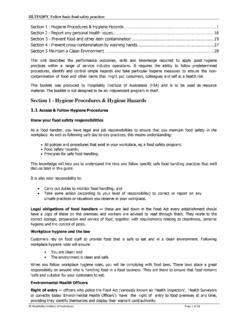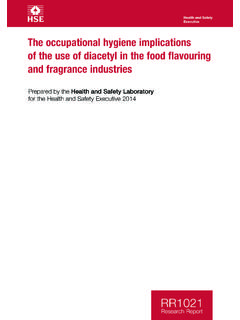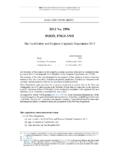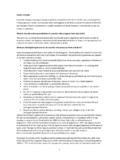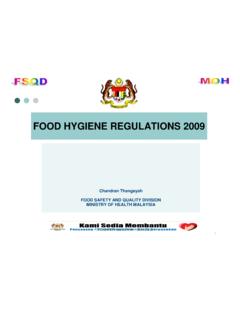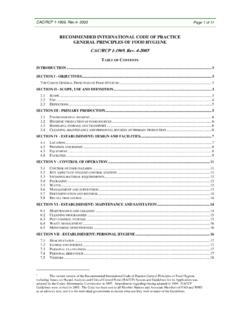Transcription of R918 - REGULATIONS GOVERNING GENERAL HYGIENE …
1 REGULATIONS GOVERNING GENERAL HYGIENE requirements FOR food PREMISES AND THE TRANSPORT OF food Published under Government Notice No. of 30 July 1999 As corrected by: Government Notice No. R. 723 of 12 July 2002 The Minister of Health has, in terms of section 35, read with section 40, of the Health Act, 1977 (Act No. 63 of 1977), made the REGULATIONS in the Schedule. SCHEDULE Definitions In these REGULATIONS any word or expression to which a meaning has been assigned in the Act shall have such meaning and, unless the context otherwise indicates - animal means any member of the animal kingdom; available includes available elsewhere than on the food premises in question; best available method means a method which is practicable and necessary for the protection of food against contamination or spoilage, having due regard to local conditions and circumstances whether at or on food premises or elsewhere, the prevailing extent of established practice and the financial implications thereof; certificate of acceptability means a certificate of acceptability referred to in regulation 3.
2 Clean means free of any dirt, impurity, objectionable matter or contamination to the extent that a state of HYGIENE is attained, and keep clean has a similar meaning; container or food container includes anything in which or with which food is served, stored, displayed, packed, wrapped, kept or transported and with which food is in direct contact; contaminate means the effect exerted by an external agent on food so that it (a) does not meet a standard or requirement determined by any law; (b) does not meet acceptable food HYGIENE standards or consumer norms or standards; or (c) is unfit for human consumption; and contamination has a corresponding meaning; core temperature means the temperature reading taken in the estimated centre of the food ; facility means any apparatus, appliance, equipment, implement, storage space, working surface or object used in connection with the handling of food ; food means a foodstuff intended for human consumption as defined in section 1 of the Foodstuffs, Cosmetics and Disinfectants Act, 1972 (Act No.)
3 54 of 1972), excluding food referred to in regulation 14; 2 food handler means a person who in the course of his or her normal routine work on food premises comes into contact with food not intended for his or her personal use; food premises means a building, structure, stall or other similar structure, and includes a caravan, vehicle, stand or place used for or in connection with the handling of food ; good manufacturing practice means a method of manufacture or handling or a procedure employed, taking into account the principles of HYGIENE , so that food cannot be contaminated or spoiled during the manufacturing process; handle includes manufacture, process, produce, pack, prepare, keep, offer, store, transport or display for sale or for serving, and handling has a corresponding meaning; hands includes the forearm or the part of the arm extending from the wrist to the elbow; health hazard includes any condition, act or omission that may contaminate or spoil food so that consumption of such food is likely to be dangerous or detrimental to health; inspector means a medical officer of health appointed in terms of section 22(1) of the Act, or an environmental health officer or veterinary surgeon appointed in terms of section 24(1) of the Act; perishable food means any foodstuff which on account of its composition, ingredients, moisture content and/or pH value and of its lack of preservatives and suitable packaging is susceptible to an uninhibited increase in microbes thereon or therein if the foodstuff is kept within the temperature spectrum of 4oC to 65oC, and includes the perishable foodstuffs listed in Government Notice No.
4 Of 1 June 1990, as amended, excluding fruit and vegetables; person in charge , with regard to any food premises, means a natural person who is responsible for the food premises and/or the owner of such food premises, as the case may be; prepacked food , means food which, before it is presented for sale or for serving, has been packed as contemplated in regulation 7(3); ready-to-consume food means any perishable food which may be consumed without having to undergo any further process of preparation to make it consumable; serve includes the provision of food whether for a consideration or otherwise; the Act means the Health Act, 1977 (Act No. 63 of 1977); thermometer means an apparatus which can give the temperature readings referred to in these REGULATIONS , the combined accuracy of such a thermometer and its temperature-sensitive sensor being approximately O,5oC; these REGULATIONS includes any annexure to these REGULATIONS ; unsound means unwholesome sick, polluted, infected, contaminated, decayed or spoiled, or unfit for human consumption for any reason whatsoever; vehicle means a train, trolley, wagon, cart, bicycle, sled, truck, boat, ship or aeroplane, and 3includes any other craft, vehicle or conveyance used in the handling or transport of food ; water means water that complies with the requirements set out in SABS 241: Water for domestic supplies.
5 Application 2. (1) Any reference in these REGULATIONS to a local authority shall also be interpreted as a reference to the head of a provincial administration - (a) where a local authority has failed to heed a notice in terms of section 15(1) of the Act; (b) where a local authority has been relieved of a power or duty by notice in terms of section 20(5)(a) of the Act; or (c) in respect of an area where there is no local authority as contemplated in section 30(1) of the Act. (2) A local authority which does not have the services of an inspector at its disposal for any reason may use the services of an inspector from another health authority or in private practice to exercise or execute the powers or duties of an inspector referred to in these REGULATIONS . (3) No provision of these REGULATIONS that is in conflict with REGULATIONS made under the Act with regard to the handling or transport of certain foods shall be valid in so far as it so conflicts.
6 Certificate of acceptability 3. (1) Subject to the provisions of subregulation (2) and regulation 15(5), no person shall handle food or permit food to be handled - (a) on food premises in respect of which a valid certificate of acceptability has not been issued or is not in force (b) in contravention of any restriction or condition or stipulation contained in such certificate of acceptability. (2) The provisions of subregulation (1) shall come into effect in the case of food premises existing at the time of publication of these REGULATIONS on the first day following a period of one year after the date of promulgation of these REGULATIONS . (3) The person in charge of any food premises wishing to obtain a certificate of acceptability in respect of such food premises shall apply therefor in writing to the local authority in whose area of jurisdiction the food premises are situated on a form containing at least the particulars that are substantially the same as those contained in the form in Annexure A to these REGULATIONS .
7 (4) Upon receipt of an application referred to in subregulation (3), the local authority shall without delay refer the application to an inspector for consideration. 4(5) An inspector may, in considering such an application, request such further information as he or she may deem necessary or expedient from the applicant or from any other person. (6) If an inspector, after having carried out an inspection, is satisfied that the food premises concerned, having due regard to existing conditions of the adjacent land and facilities, subject to the provisions of REGULATIONS 4(2) and 15 - (a) do in all respects comply with the provisions of REGULATIONS 5 and 6, a local authority shall issue a certificate of acceptability in the name of the person in charge on a form that is substantially the same as the form in Annexure B of these REGULATIONS ; or (b) do not in all respects comply with the provisions of REGULATIONS 5 and 6, a local authority may, subject to the provisions of regulation 4(2), grant an extension for a maximum of six months to enable the person in charge so to change or equip the food premises that they comply with the provisions in question: Provided that during the said period of extension the provisions of subregulation (1) shall not apply to the person concerned.
8 (7) A certificate of acceptability shall be displayed in a conspicuous place for the information of the public on the food premises in respect of which it was issued or a copy thereof shall immediately be made available on request where the display thereof is impractical. (8) If the person in charge of food premises is replaced by another person, such person shall inform the local authority in writing of such replacement within 30 days after the date thereof and the local authority shall subject to the provisions of regulation 4(2), issue a new certificate of acceptability in the name of the new person in charge. (9) A certificate of acceptability - (a) shall not be transferable from one person to another person and from one food premises to another food premises; (b) shall be valid only in respect of the nature of handling set out in the application for a certificate of acceptability; (c) may at any time be endorsed by a local authority by - (i) the addition of any further restriction that may be necessary to prevent a health hazard; and (ii) the removal of any restriction with regard to the category or type of food or the method of handling; (d) shall expire temporarily for the period during which a prohibition under regulation 4(2) is in effect (e) shall expire permanently if a prohibition referred to in regulation 4(2) is not removed within a stipulated period which shall not exceed six months from the date on which a notice was issued in terms of regulation 4(2).
9 (f) shall expire permanently if the provisions of subregulation (8) are not complied with. (10) No person may make any unauthorised changes or additions to or forge a certificate of acceptability. 5 Prohibition on the handling and transportation of food 4. (1) No person shall handle food in a manner contrary to the provisions of these REGULATIONS . (2) If an inspector following an inspection of food premises or a facility is of the opinion - (a) that such food premises or facility - (i) are or is in such a condition or used in such a manner; or (ii) do or does not comply with these REGULATIONS to the extent; (b) that a particular activity with regard to the handling of food takes place in such a manner; or (c) that such circumstances exist with regard to the food premises or facility or any other activity, that they or it constitute a health hazard and that the continued use of the food premises or facility or the activity should be prohibited, the local authority may summarily prohibit the use of the food premises or facility for the handling of food or any of the activities that relate to the handling of food , by serving a written notice in terms of section 52 of the Act on the person in charge or, if he or she is not available, his or her representative informing such person of the prohibition.
10 (3) A notice referred to in subregulation (2) shall contain at least the following particulars: (a) The reason(s) for the prohibition; (b) a statement that the prohibition will in writing be removed by a local authority as soon as the reason(s) for the prohibition has (have) been removed and provided the inspector is satisfied that the reason(s) for the prohibition is (are) not likely to recur. (4) (a) A prohibition shall come into operation from the time at and the date on which a notice is served under subregulation (2). (b) No person shall perform any act that is contrary to such prohibition. (5) An inspector shall, within 72 working days hours of receiving a request for the removal of a prohibition, carry out an investigation of the food premises, facility, activity or circumstance which gave rise to the prohibition and the local authority shall upon completion of such investigation in writing inform the person on whom the prohibition notice was served or, if he or she is not available, any other person representing such person that the prohibition has been removed or remains, as the case may be.
